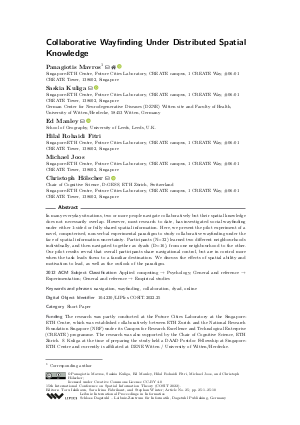Collaborative Wayfinding Under Distributed Spatial Knowledge (Short Paper)
Authors
Panagiotis Mavros  ,
Saskia Kuliga
,
Saskia Kuliga  ,
Ed Manley
,
Ed Manley  ,
Hilal Rohaidi Fitri,
Michael Joos,
Christoph Hölscher
,
Hilal Rohaidi Fitri,
Michael Joos,
Christoph Hölscher 
-
Part of:
Volume:
15th International Conference on Spatial Information Theory (COSIT 2022)
Part of: Series: Leibniz International Proceedings in Informatics (LIPIcs)
Part of: Conference: Conference on Spatial Information Theory (COSIT) - License:
 Creative Commons Attribution 4.0 International license
Creative Commons Attribution 4.0 International license
- Publication Date: 2022-08-22
File

PDF
LIPIcs.COSIT.2022.25.pdf
- Filesize: 3.39 MB
- 10 pages
Document Identifiers
Subject Classification
ACM Subject Classification
- Applied computing → Psychology
- General and reference → Experimentation
- General and reference → Empirical studies
Keywords
- navigation
- wayfinding
- collaboration
- dyad
- online
Metrics
- Access Statistics
-
Total Accesses (updated on a weekly basis)
0PDF Downloads0Metadata Views
Abstract
In many everyday situations, two or more people navigate collaboratively but their spatial knowledge does not necessarily overlap. However, most research to date, has investigated social wayfinding under either 1-sided or fully shared spatial information. Here, we present the pilot experiment of a novel, computerised, non-verbal experimental paradigm to study collaborative wayfinding under the face of spatial information uncertainty. Participants (N=32) learned two different neighbourhoods individually, and then navigated together as dyads (D=16), from one neighbourhood to the other. Our pilot results reveal that overall participants share navigational control, but are in control more when the task leads them to a familiar destination. We discuss the effects of spatial ability and motivation to lead, as well as the outlook of the paradigm.
Cite As Get BibTex
Panagiotis Mavros, Saskia Kuliga, Ed Manley, Hilal Rohaidi Fitri, Michael Joos, and Christoph Hölscher. Collaborative Wayfinding Under Distributed Spatial Knowledge (Short Paper). In 15th International Conference on Spatial Information Theory (COSIT 2022). Leibniz International Proceedings in Informatics (LIPIcs), Volume 240, pp. 25:1-25:10, Schloss Dagstuhl – Leibniz-Zentrum für Informatik (2022)
https://doi.org/10.4230/LIPIcs.COSIT.2022.25
BibTex
@InProceedings{mavros_et_al:LIPIcs.COSIT.2022.25,
author = {Mavros, Panagiotis and Kuliga, Saskia and Manley, Ed and Fitri, Hilal Rohaidi and Joos, Michael and H\"{o}lscher, Christoph},
title = {{Collaborative Wayfinding Under Distributed Spatial Knowledge}},
booktitle = {15th International Conference on Spatial Information Theory (COSIT 2022)},
pages = {25:1--25:10},
series = {Leibniz International Proceedings in Informatics (LIPIcs)},
ISBN = {978-3-95977-257-0},
ISSN = {1868-8969},
year = {2022},
volume = {240},
editor = {Ishikawa, Toru and Fabrikant, Sara Irina and Winter, Stephan},
publisher = {Schloss Dagstuhl -- Leibniz-Zentrum f{\"u}r Informatik},
address = {Dagstuhl, Germany},
URL = {https://drops.dagstuhl.de/entities/document/10.4230/LIPIcs.COSIT.2022.25},
URN = {urn:nbn:de:0030-drops-169105},
doi = {10.4230/LIPIcs.COSIT.2022.25},
annote = {Keywords: navigation, wayfinding, collaboration, dyad, online}
}
Author Details
- Singapore-ETH Centre, Future Cities Laboratory, CREATE campus, 1 CREATE Way, #06-01 CREATE Tower, 138602, Singapore
- Singapore-ETH Centre, Future Cities Laboratory, CREATE campus, 1 CREATE Way, #06-01 CREATE Tower, 138602, Singapore
- German Center for Neurodegenerative Diseases (DZNE) Witten site and Faculty of Health, University of Witten/Herdecke, 58453 Witten, Germany
- Singapore-ETH Centre, Future Cities Laboratory, CREATE campus, 1 CREATE Way, #06-01 CREATE Tower, 138602, Singapore
- Singapore-ETH Centre, Future Cities Laboratory, CREATE campus, 1 CREATE Way, #06-01 CREATE Tower, 138602, Singapore
Funding
The research was partly conducted at the Future Cities Laboratory at the Singapore-ETH Centre, which was established collaboratively between ETH Zurich and the National Research Foundation Singapore (NRF) under its Campus for Research Excellence and Technological Enterprise (CREATE) programme. The research was also supported by the Chair of Cognitive Science, ETH Zürich. S. Kuliga at the time of preparing the study held a DAAD Postdoc Fellowship at Singapore-ETH Centre and currently is affiliated at DZNE Witten / University of Witten/Herdecke.
Acknowledgements
We are grateful for the advice of Dr Iva Barisic on social wayfinding, and the support of the ETH Zürich Decision Science Lab team: Stefan Wehrli, Lea Imhof, and Salome Egli.
References
-
Crystal Bae and Advisor Daniel R Montello. Route Planning and Situated Navigation in Collaborative Wayfinding. In 14th International Conference on Spatial Information Theory (COSIT 2019), 2019.

-
Iva Barisic. Social and spatial factors of wayfinding usability . PhD thesis, ETH Zürich, 2019.

- Kelly Jane Bryden, Judith Charlton, Jennifer Oxley, and Georgia Lowndes. Older driver and passenger collaboration for wayfinding in unfamiliar areas. International Journal of Behavioral Development, 38(4):378-385, 2014. URL: https://doi.org/10.1177/0165025414531466.
- Kim Yin Chan and Fritz Drasgow. Toward a theory of individual differences and leadership: Understanding the motivation to lead. Journal of Applied Psychology, 86(3):481-498, 2001. URL: https://doi.org/10.1037/0021-9010.86.3.481.
- Ruth Conroy Dalton, Christoph Hölscher, and Daniel R. Montello. Wayfinding as a social activity. Frontiers in Psychology, 10(FEB):1-14, 2019. URL: https://doi.org/10.3389/fpsyg.2019.00142.
- Gengen He, Toru Ishikawa, and Makoto Takemiya. Collaborative Navigation in an Unfamiliar Environment with People Having Different Spatial Aptitudes. Spatial Cognition and Computation, 15(4):285-307, 2015. URL: https://doi.org/10.1080/13875868.2015.1072537.
- Mary Hegarty, AE Richardson, and DR Montello. Development of a self-report measure of environmental spatial ability. Intelligence, 30:425-447, 2002. URL: http://www.sciencedirect.com/science/article/pii/S0160289602001162.
- Pekka Kallioniemi, Tomi Heimonen, Markku Turunen, Jaakko Hakulinen, Tuuli Keskinen, Laura Pihkala-Posti, Jussi Okkonen, and Roope Raisamo. Collaborative navigation in virtual worlds: How gender and game experience influence user behavior. In Proceedings of the ACM Symposium on Virtual Reality Software and Technology, VRST, volume 13-15-Nove, pages 173-182, 2015. URL: https://doi.org/10.1145/2821592.2821610.
